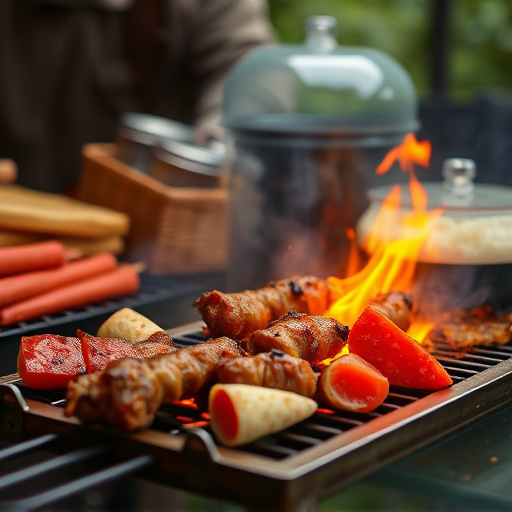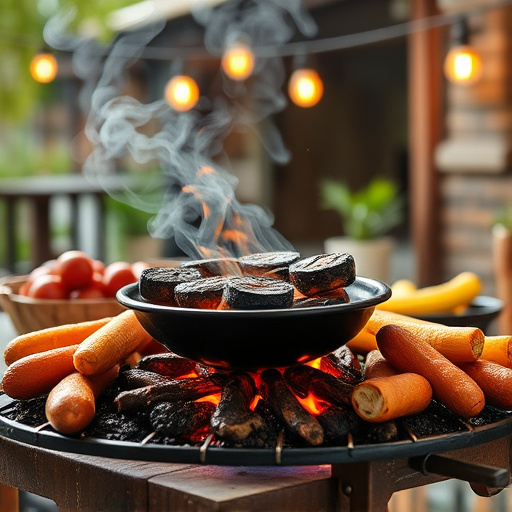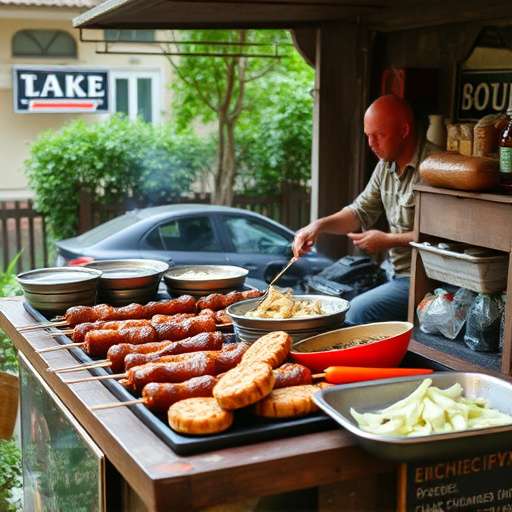Select marbled, lean steaks like sirloin or ribeye cut into uniform pieces for a delicious beef BBQ recipe. Marinate with olive oil, herbs, lemon juice, salt, pepper, and liquid for at least 2 hours. Use seasonal vegetables like asparagus, bell peppers, butternut squash for vibrant, nutritious kabobs. Marinate in acidic ingredients and aromatic spices, use indirect heat during grilling.
Discover the art of grilling flavorful beef kabobs with seasonal vegetables. This guide explores everything from selecting the perfect cut of beef to mastering marination techniques and choosing vibrant produce. Learn step-by-step how to achieve tender, juicy kabobs that’ll impress. Elevate your outdoor cooking game with this delicious beef bbq recipe.
- Choosing the Perfect Cut of Beef for Kabobs
- Marinating for Maximum Flavor: A Step-by-Step Guide
- Selecting Seasonal Vegetables for a Colorful Dish
- Cooking Techniques to Achieve Tender, Juicy Kabobs
Choosing the Perfect Cut of Beef for Kabobs

When it comes to crafting mouthwatering beef kabobs, selecting the right cut of meat is half the battle won. For this grilling delight, opt for a marbled, lean steak such as sirloin or ribeye. These cuts provide an ideal balance between tenderness and flavor, ensuring each bite is juicy and succulent. The marbling adds richness while still allowing the natural beefy taste to shine, making it perfect for a savory bbq recipe.
Choosing the right size pieces is key; larger, thicker slices will grill more evenly and retain their moisture. Cut the steak into uniform cubes or strips, ensuring each piece is bite-sized and appealing. This technique guarantees that your kabobs cook consistently, resulting in a delightful blend of tender beef and seasonal vegetables on your barbecue.
Marinating for Maximum Flavor: A Step-by-Step Guide

To unlock the full potential of your beef BBQ recipe, marinating is a key step that can’t be skipped. The process allows flavors to penetrate deep into the meat, transforming it into a juicy and tender delight on the grill. Start by combining a generous amount of high-quality olive oil with a blend of aromatic herbs like garlic, rosemary, thyme, and oregano. Add a squeeze of lemon juice for acidity, along with a touch of salt and pepper to enhance the natural taste of the beef.
Next, add your choice of liquid – red wine is an excellent option – to create a rich marinade. Allow the beef kabobs to soak in this flavorful mixture for at least 2 hours, or preferably overnight, in the refrigerator. This step will ensure that every fiber of the meat absorbs the delicious aroma and creates a mouthwatering beef BBQ recipe that’s sure to impress your guests.
Selecting Seasonal Vegetables for a Colorful Dish

When it comes to selecting vegetables for your flavorful beef kabobs, think seasonality and color. Choose vibrant produce that’s at its peak freshness; this ensures a burst of natural flavors in every bite. In spring, asparagus, feta cheese, and cherry tomatoes add a pop of color and texture. Summer brings juicy bell peppers, zucchini, and sweet corn, while autumn offers delicious butternut squash, apples, and carrots. Don’t be afraid to mix and match; the goal is a colorful dish that’s both nutritious and delicious, perfect for any beef bbq recipe.
Cooking Techniques to Achieve Tender, Juicy Kabobs

To ensure your beef kabobs are both tender and juicy, there are several cooking techniques to employ. First, marinating is key; it helps break down the fibers in the meat, making it more tender. A good beef bbq recipe often includes a blend of acidic ingredients like lemon juice or vinegar, along with aromatic spices such as garlic, cumin, or paprika. Letting the meat soak in this marinade for at least an hour—or even overnight—will significantly enhance its flavor and tenderness.
During grilling, it’s important to use indirect heat rather than direct, intense flames. This allows the meat to cook slowly and evenly, ensuring it stays moist. Skewering the beef and vegetables together is another trick; the veggies will not only add flavor but also act as a natural barrier between the meat and the grill, taming any direct heat and preventing them from drying out.
